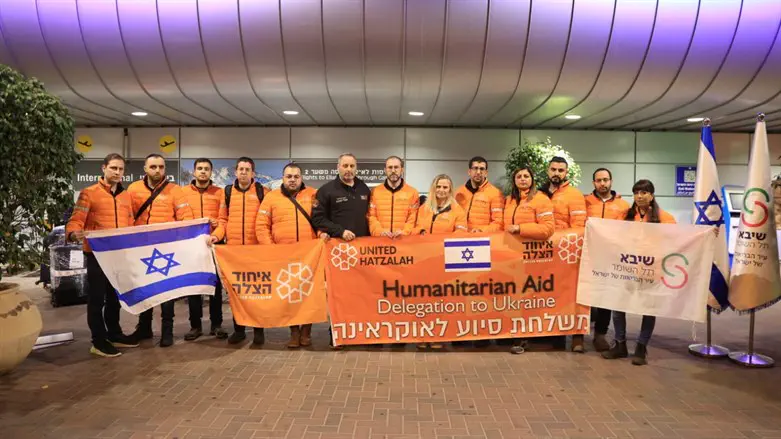
The first group (jump team) of United Hatzalah’s humanitarian aid mission to Ukraine is departing Israel Saturday night and will establish itself on the Ukrainian border with Moldova.
The group aims to provide medical and psychological treatment, as well as humanitarian aid, to refugees who are fleeing the conflict in Ukraine.
The jump team, which is comprised of 12 EMTs, paramedics, doctors, a dentist, and members of the Psychotrauma and Crisis Response Unit, will be tasked with providing initial aid, assessing needs, and building a comprehensive long-term treatment plan. In Moldova, they will be met with additional team members joining from Miami, Florida.
In the coming days, an additional team comprised of 30 medical personnel, also EMTs, paramedics, doctors, and members of the Psychotrauma and Crisis Response Unit, will be joining the jump team. The delegation was formed at the request of the Chief Rabbi of Moldova, Rabbi Pinchas Salzman, and in coordination with the Israeli Foreign Ministry.
“The volunteers are equipped with medical and humanitarian supplies and will be tasked with providing assistance to those crossing the border from Ukraine into Moldova,” said the Vice President of Operations Dov Maisel, who was on hand to send the group off on their journey. “The delegation is joined by a representative from Sheba Beyond, a program from Sheba (Tel Hashomer) Hospital, who will assist with the installation and operation of remote medical equipment that will enable doctors from Israel to train and assist medical practitioners in the field at the border.”
Leader of the delegation EMT David Krispel, added, “Due to air space closures, we are flying first to Romania, and from there we will be traveling by land to Kishinev in Moldova. There we will connect with representatives of the Jewish community, and Israeli representatives from the Foreign Ministry, and together we will build a refined strategy for the mission.”
A representative from “Sheba Beyond,” the virtual hospital of Sheba Medical Center, will be taking part in the humanitarian aid mission. The program will be sending advanced technological equipment that will be used to set up a remote medicines station. With the help of these measures, doctors from a variety of areas of expertise in Sheba Medical Center will be able to assist medically, and remotely perform procedures in real time together with the teams in the field.
The equipment sent to the relief area includes devices for remote physical examination, devices for remote cardiac monitoring, and the remote monitoring of vital signs. Among them are a portable ultrasound device and a device for performing a remote blood test.
“We have the ability to provide remote assistance and use advanced technologies to bring the high quality of Sheba medical care to areas that are also experiencing medical crises,” says Dr. Galia Barkai, Sheba's director of the Beyond program. “The advanced equipment in the field will be connected online to Sheba's computers so that we can guide, advise, and help the delegation’s staff in providing expert medical care in the field.”
Sarit Lerner, the director of technology at the virtual hospital, is Sheba's representative on the delegation. Sarit will be working together with the representatives of United Hatzalah’s jump team. She will be tasked with managing and taking care of the equipment and will strengthen greatly the effectiveness of the medical capabilities that United Hatzalah’s team will be able to perform in the field.
“As soon as the delegation crystallized, it was clear to us that we could help and be a complementary factor,” Sarit said. “I have no fear of what we face. I see the trip as a true representation of us all. We have a responsibility to utilize the information and capabilities that we possess in order to help others in need and provide humanitarian assistance to our fellow people anywhere in the world.”

